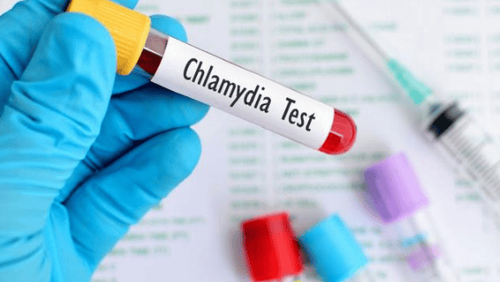This is an automatically translated article.
Chlamydia trachomatis bacteria cause Chlamydia infection - a common sexually transmitted disease. Although the symptoms of Chlamydia infection are usually mild or absent, it can cause serious complications, especially infertility, in both men and women.1. What is chlamydia?
Chlamydia bacteria are intracellular bacteria due to their inability to synthesize high molecular energy compounds (ATP and GTP). This bacterium has an unusual multiplication cycle. Cycles follow each other with two very specific patterns in response to intracellular and extracellular life. Chlamydia's multiplication cycle is about 48 - 72 hours, the cells are destroyed and the basal body of the infection is released.
Chlamydia bacteria have three biological variants with different clinical and biological manifestations.
Variants causing trachoma (trachoma - serovars A, B and C) Variants causing genital tract diseases in humans (urethritis , cervicitis, salpingitis, uterine pathology). ..) which mainly causes symptomatic and asymptomatic urethritis. The mango trachoma variant has the same serogroup as the trachoma variant but has a widespread infiltrative clinical picture, causing more damage in the genitourinary region.
2. Mode of transmission of chlamydia
Chlamydia is mainly transmitted by unprotected sex, in any form (vaginal, anal or oral).
Chlamydia can also be transmitted during childbirth from mother to baby.
All sexually active people can get Chlamydia. The more sexual partners, the higher the risk of infection.
At-risk subjects:
Young women, the cervix is not yet fully mature, so it is very easy to be infected with Chlamydia bacteria, especially if the early sexual activity is higher, the risk is higher. Gay men are also at risk of contracting Chlamydia during oral or anal sex.

Vi khuẩn chlamydia lây qua quan hệ tình dục không bảo vệ
3. Is chlamydia bacteria dangerous?
Chlamydia bacteria cause a great impact on fertility with many accompanying diseases such as:
Adhesions and blockages of the uterus, fallopian tubes, ovaries and surrounding components of the female reproductive system are adhered to each other by the thin filament. Fallopian tube occlusion is caused by fibrous bands that fold the angle of the fallopian tube or stick to a blocked fallopian tube. Chlamydia urethritis can cause pelvic inflammatory disease, which can lead to ectopic pregnancy or infertility. During pregnancy, Chlamydia bacteria can cause premature rupture of membranes, bacteremia, preterm delivery, postpartum infections and Chlamydia infections in newborns. Adnexitis and upper genital tract infections cause long-term damage to the fallopian tubes, uterus, and surrounding tissues. They are the cause of chronic pelvic pain Chlamydia bacteria also increase the risk of HIV infection if exposed. Uterine cancer can occur when infected with Chlamydia bacteria and HPV - a virus of the genital tract. In men, when infected with Chlamydia bacteria, it causes inflammation of the testicles and epididymis, leading to infertility. In addition, Chlamydia bacteria also affect sperm quality.
Sometimes genital Chlamydia infection can cause arthritis complications associated with skin lesions, eye inflammation and urethritis (Reiter's syndrome).

Vi khuẩn chlamydia gây ung thư tử cung
4. Prevention of Chlamydia
To help prevent serious complications, all sexually active women 25 years of age and younger should be screened for Chlamydia at least once a year. Annual screening is also recommended for older women with risk factors for Chlamydia infection (having a new sex partner or having multiple sex partners).
Chlamydia screening for all pregnant women.
Once infected with Chlamydia, it is necessary to adhere to treatment and may apply preventive treatment to the sexual partners of the infected person to limit the possibility of disease transmission.
Any genital symptoms such as abnormal discharge, pain, bad odor, burning when urinating, or bleeding between menstrual cycles can indicate an infection. STDs need to see a specialist for the earliest treatment, to avoid complications.
Early treatment of STIs if you know you have STIs in general and Chlamydia in particular to prevent the risk of appendicitis.
People with Chlamydia should not resume sex until all their sexual partners have been tested and treated if necessary.
Vinmec International General Hospital offers a Package of Examination and Screening for social diseases to help customers detect diseases early and have effective treatment and prevent dangerous complications. The screening package for social diseases at Vinmec is for all ages, both men and women.
To register for examination and treatment at Vinmec International General Hospital, you can contact Vinmec Health System nationwide, or register online HERE.
MORE:
Diagnosis, treatment and complications of gonorrhea Learn about sexually transmitted infections chlamydia, gonorrhea and syphilis When to think about getting tested for STIs?













